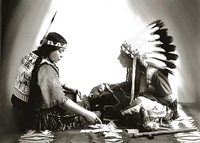Internet Gambling: How involved are the Indian
tribes?
Last November a law went into effect which
made financial transactions to online gambling websites illegal,
the so-called UIGEA.
 Many
are willing to blame the Republicans for this law, although it
was passed by both Republicans and Democrats. And the only
attempt to "repeal" the law came from Rep. Barney Frank
(D-Mass), which, of course, had nothing to do with repealing the
law, but with further limiting the presence of the offshore
Internet gambling companies in the United States.
Many
are willing to blame the Republicans for this law, although it
was passed by both Republicans and Democrats. And the only
attempt to "repeal" the law came from Rep. Barney Frank
(D-Mass), which, of course, had nothing to do with repealing the
law, but with further limiting the presence of the offshore
Internet gambling companies in the United States.
Funny thing about Mr. Frank's proposed bill is
that it does not make offshore online gambling legal, and the
individual states can continue banning online gambling at their
sole discursion. The Indian tribes, however, could opt-in to run
Internet gambling websites within their states. This should make
you think to what extend are the Indian tribes involved in the
current online gambling legislation and other pieces of it in
the past.
Documents
released in the press clearly
show the involvement of some of the Indian tribes with the
famous lobbyist Jack Abramoff and even the White
House. We will not go into details about these transactions, but
in a nutshell, the Agua Caliente Indian Tribe has been "working"
pretty close with the above mentioned. Literally millions of
dollars exchanged hands, according to the documents, to help the
tribe in their gambling business. There is no word on Internet
gambling in the papers, but that's not the point.
The point is that we are currently witnessing
the biggest ever casino gambling expansion by the Indian tribes
in the United States. And there is plenty of proof that some
tribes have been greasing the wheels.
And the question is - have they greased the
Internet gambling bill? Let's face it, the Internet gambling
companies are hurting the land based casino business. Not as
much as they would have 10 years ago, when casinos were all
about gambling, and now they focus more on entertainment, such
as shows, concerts, boxing matches, etc, but still a big chunk
of possible land based casino revenue goes offshore. So could
the Indian tribes afford to expand their gambling venues to
record numbers, as it is in California, for example, if the
financial barriers on the Internet gambling were not in place?
We think not.
Of course, online gambling cannot put the land
based casinos out of business, but if we assume that the figure
$8 billion per year spent at the Internet gambling websites by
U.S. citizens is correct, and let's say that at least half of
that number is now cut-off, and further assume that half would
now go the land based gambling houses - that's $2 billion more
each year to split among the land based casinos. That's a lot of
money, on top on what the casinos already make - Nevada casinos
have been showing record numbers, for example, in the past few
months.
We don't know if Abramoff was involved with
Internet gambling companies. All we know for sure is that he was
lobbying against online gambling bills which had included online
lotteries to be banned in the U.S. and his job was to not let
this happen. Of course, it is expected the publicly traded U.K.
online gambling business to lobby against bills like that, but
there is no proof that Abramoff was the one working with them.
U.S. is probably the only country in the world where the
lobbying business is openly exposed and accepted, that is,
companies paying lawmakers to make or not make a bill into a
law.
Here is a fictional scenario: Lawmakers with a
lot of Indian casinos in their states naturally receive campaign
contributions and lobbying money from those casinos. Later they
pass a bill in benefit of the casinos. Sweet.
As many begin to realize that people gamble
online not just for the sake of gambling, but because it's more
fun, it's much more convenient, non-smokers do not have to
breath smoke, and smokers in some states do not have to be
separated in a leprosy-like wards, not to mention that with the
current gas prices, driving 70-100 miles to the nearest casino
and back is a gamble by itself, it is to be expected that more
and more "pro-online gambling" bills would start popping up. And
mark my word, those bills will contain a lot of text concerning
the Indian tribes' Internet gambling future.
05/24/2007
Related news:
E-mail:
news@ogpaper.com